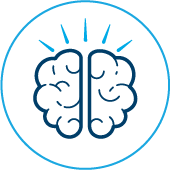Hereditary Neurological Disorders
Over 6 million people in the U.S. are affected by a neurological disorder
What is an Inherited Neurological Disorder?
A neurological disorder is any medical issue that affects the nervous system. Your body’s nervous system includes your brain, spinal cord, and other nerves. Problems with the structure or function of any part of the nervous system can lead to a neurological disorder.
There are many causes for neurological disorders, including infections, injuries, and environmental factors such as poor nutrition or exposure to heavy metals like lead. A change in a gene can change the instructions to our brain, spinal cord and other nerves, which could result in a neurological disorder.
Recognize the Symptoms of a Neurological Disorder
Symptoms of a neurological disorder can be mild, such as muscle weakness, poor coordination, or changes in thinking patterns. Symptoms can also be more noticeable, such as seizures, pain, and intellectual disability. People with a neurological disorder can have just one or many of these symptoms.
Most neurological disorders that are caused by gene changes will begin affecting a person early in life, usually in childhood and sometimes even as early as birth. However, some neurological disorders caused by gene changes don’t affect a person until later in life. Any signs or symptoms may not be obvious until well into adulthood.
Genetic testing can be helpful in identifying the cause of the neurological disorder in many different situations.
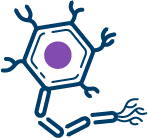
Over 6 million people in the US are affected by a neurological disorder

1-2% of children in the US have an autism spectrum disorder

2-3% of people in the US have an intellectual disability
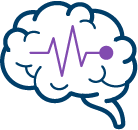
1 in 26 people have epilepsy
How Genetic Testing May Help

Your healthcare provider can give you better information about what to expect based on your genetic test results.

Looking at current or worsening symptoms, or using screening tests, can help find new symptoms as early as possible.

Your healthcare provider may discuss possible treatment options, such as using a medical dietary therapy or certain types of anti-seizure medications.

Discussing the possibilities revealed in your genetic test results may help you to avoid other, potentially invasive, testing.
How Genetic Testing May Help Your Family
CAN NEUROLOGICAL DISORDERS RUN IN FAMILIES?
Many people with a neurological disorder are the first person in their family to have it. Often, genetic testing can find a gene mutation for someone with a neurological disorder that is not found in other family members and was not passed down from a parent. This is called a de novo, or new, gene mutation in a family.
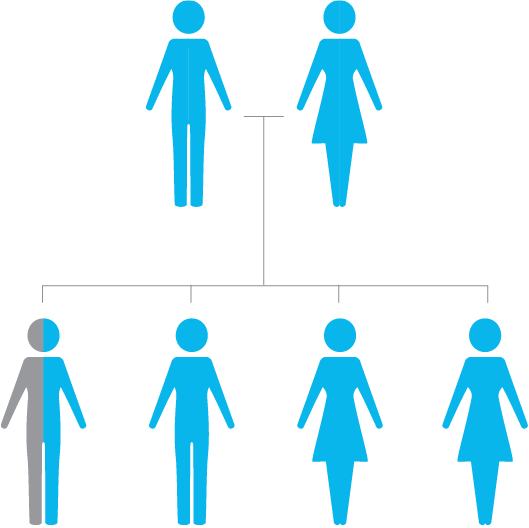
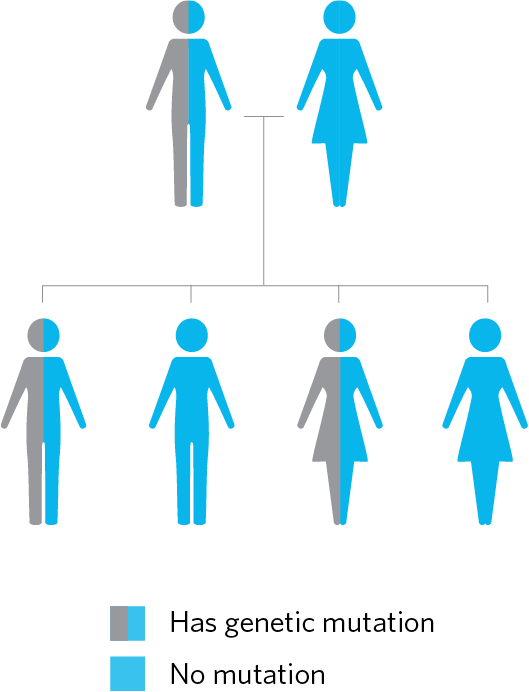
In other families, gene changes that cause neurological disorders can be inherited from earlier generations.
Your doctor or genetic counselor can talk with you more about the inheritance pattern of the neurological disorder in your family.
Am I a Candidate for Genetic Testing?
YOUR GENES CARRY A STORY THAT IS UNIQUE TO YOU AND MAKES YOU WHO YOU ARE.
Genetic testing can help you better understand and manage the neurological disorder that may be occurring in your family.
Genetic testing for neurological disorders can include a variety of genes that are linked to the symptoms that your family member has. Based on the results, your healthcare provider may discuss more specific prognosis and treatment options for you and your family.
*Your healthcare provider may identify other reasons why you could consider genetic testing.
**Family members” refers to blood relatives, such as brothers / sisters / parents / grandparents / aunts / uncles / cousins
How is genetic testing performed for neurological disorders?
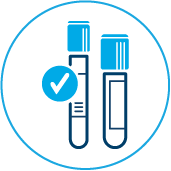
Samples sent from you (and parents) to the lab

Lab performs testing

Reports available in 1-6 weeks, depending on the tests ordered

What Test Results Can I Expect? And What Do I Do Once I Have Them?
POSITIVE, NEGATIVE, OR A VARIANT OF UNKNOWN SIGNIFICANCE (VUS)
Results from your genetic tests will fall into one of three categories:
A mutation related to a hereditary neurological disorder has been found in at least one of your tested genes:
A mutation was found in at least one of the genes tested.
There may be management recommendations specific to the gene that has a mutation.
Genetic testing for certain family members may be recommended.
No genetic mutations were found in any of your tested genes
Management recommendations for you may still be discussed, which will be based on your personal and family history
The issue of whether genetic testing should be considered for your family members may also be reviewed
At least one genetic change was found, but it is unclear if this change causes the neurological disorder or not
Management recommendations will be based on personal and family history
Discuss if genetic testing should be considered for your family members with your healthcare provider
Be aware that these results may change over time as we learn more information, and you could possibly get an updated result in the future
Tests and Gene Information
Find information about our neurology tests here. Click the arrows to expand the gene list to see all of genes that are included on each test. By clicking on each gene, you can find more information that would be important for a person who tests positive for a mutation in that gene. These Understanding Your Results pages are included with positive test reports from Ambry.
EpilepsyNext®
124 of the more common genes associated with a variety of genetic epilepsies
|
ALDH7A1 |
AMT |
ANKRD11 |
ARHGEF9 |
ARX |
ASNS |
ATP13A2 |
ATP1A2 |
|
ATP1A3 |
BRAT1 |
CACNA1A |
CACNA1E |
CASK |
CDKL5 |
CHD2 |
CHRNA2 |
|
CHRNA4 |
CHRNB2 |
CLN3 |
CLN5 |
CLN6 |
CLN8 |
CNTNAP2 |
COL4A1 |
|
CSTB |
CTSD |
CTSF |
DCX |
DDC |
DEPDC5 |
DNAJC5 |
DNM1 |
|
DYNC1H1 |
DYRK1A |
EEF1A2 |
EHMT1 |
EPM2A |
FLNA |
FOLR1 |
FOXG1 |
|
FOXP1 |
GABRA1 |
GABRB3 |
GABRG2 |
GAMT |
GATM |
GLDC |
GNAO1 |
|
GOSR2 |
GRIN1 |
GRIN2A |
GRIN2B |
GRN |
H3F3A |
HCN1 |
HNRNPU |
|
IQSEC2 |
KCNA2 |
KCNB1 |
KCNC1 |
KCNH1 |
KCNJ10 |
KCNQ2 |
KCNQ3 |
|
KCNT1 |
KCTD7 |
KIAA2022 |
LGI1 |
MBD5 |
MECP2 |
MEF2C |
MFSD8 |
|
MOCS1 |
MOCS2 |
NGLY1 |
NHLRC1 |
PACS1 |
PCDH19 |
PHGDH |
PIGA |
|
PLCB1 |
PNKP |
PNPO |
POLG |
PPT1 |
PRICKLE1 |
PRRT2 |
PURA |
|
RHOBTB2 |
SATB2 |
SCARB2 |
SCN1A |
SCN1B |
SCN2A |
SCN3A |
SCN8A |
|
SIK1 |
SLC13A5 |
SLC19A3 |
SLC25A22 |
SLC2A1 |
SLC35A2 |
SLC6A1 |
SLC6A8 |
|
SLC9A6 |
SMC1A |
SNAP25 |
SPTAN1 |
ST3GAL5 |
STX1B |
STXBP1 |
SYNGAP1 |
|
SZT2 |
TBC1D24 |
TBL1XR1 |
TCF4 |
TPP1 |
TRIO |
TSC1 | TSC2 |
|
TUBA1A |
UBE3A |
WDR45 |
ZEB2 |
EpilepsyNext-Expanded®
Testing of >950 genes associated with genetic causes of epilepsy-related disorders
|
AAAS |
AARS |
AASS |
ABAT |
ABCC8 |
ABCD1 |
ACAD8 |
ACAD9 |
|
ACADM |
ACADVL |
ACAT1 |
ACO2 |
ACOX1 |
ACP5 |
ACSF3 |
ACTB |
|
ACTG1 |
ACTL6B |
ACVRL1 |
ACY1 |
ADAM22 |
ADARB1 |
ADAT3 |
ADGRG1 |
|
ADK |
ADNP |
ADPRHL2 |
ADSL |
AFG3L2 |
AGK |
AGL |
AGO1 |
|
AHCY |
AHDC1 |
AIFM1 |
AIMP2 |
AKT2 |
AKT3 |
ALDH18A1 |
ALDH3A2 |
|
ALDH5A1 |
ALDH7A1 |
ALDOB |
ALG1 |
ALG11 |
ALG12 |
ALG13 |
ALG14 |
|
ALG2 |
ALG3 |
ALG6 |
ALG9 |
ALMS1 |
ALPL |
AMACR |
AMER1 |
|
AMPD2 |
AMT |
ANK2 |
ANK3 |
ANKLE2 |
ANKRD11 |
ANKRD17 |
ANTXR1 |
|
AP1G1 |
AP1S2 |
AP3B2 |
AP3D1 |
AP4B1 |
AP4E1 |
AP4M1 |
AP4S1 |
|
APC2 |
APOPT1 |
AQP2 |
ARFGEF2 |
ARG1 |
ARHGAP31 |
ARHGEF9 |
ARID1A |
|
ARID1B |
ARL13B |
ARMC9 |
ARSA |
ARV1 |
ARX |
ASAH1 |
ASL |
|
ASNS |
ASPA |
ASPM |
ASS1 |
ASXL1 |
ASXL2 |
ASXL3 |
ATAD1 |
|
ATAD3A |
ATN1 |
ATP13A2 |
ATP1A2 |
ATP1A3 |
ATP2A2 |
ATP5A1 |
ATP5D |
|
ATP6AP1 |
ATP6AP2 |
ATP6V0A2 |
ATP6V1A |
ATP7A |
ATR |
ATRX |
AUH |
|
AUTS2 |
AVP |
AVPR2 |
B3GALNT2 |
B4GALNT1 |
B4GAT1 |
BCAP31 |
BCAS3 |
|
BCKDHA |
BCKDHB |
BCKDK |
BCL11A |
BCL11B |
BCS1L |
BMP4 |
BOLA3 |
|
BRAF |
BRAT1 |
BRPF1 |
BRSK2 |
BSCL2 |
BTD |
BUB1B |
C10orf2 |
|
C12orf57 |
C19orf70 |
C2orf69 |
C5orf42 |
CA5A |
CACNA1A |
CACNA1C |
CACNA1D |
|
CACNA1E |
CACNA1G |
CACNA2D2 |
CAD |
CAMK2A |
CAMK2B |
CAPN10 |
CARS2 |
|
CASK |
CASR |
CAV1 |
CBS |
CC2D1A |
CC2D2A |
CCDC115 |
CCDC88C |
|
CCM2 |
CCND2 |
CDC42 |
CDH2 |
CDK10 |
CDK13 |
CDKL5 |
CENPJ |
|
CEP85L |
CHD2 |
CHD8 |
CHKB |
CHRNA2 |
CHRNA4 |
CHRNB2 |
CIC |
|
CIT |
CKAP2L |
CLCN4 |
CLDN16 |
CLN3 |
CLN5 |
CLN6 |
CLN8 |
|
CLP1 |
CLPB |
CLPP |
CLTC |
CNKSR2 |
CNNM2 |
CNOT1 |
CNOT3 |
|
CNTNAP1 |
CNTNAP2 |
COG4 |
COG5 |
COG6 |
COG7 |
COG8 |
COL18A1 |
|
COL3A1 |
COL4A1 |
COL4A2 |
COL4A3BP |
COLGALT1 |
COQ2 |
COQ4 |
COQ6 |
|
COQ8A |
COQ9 |
COX10 |
COX15 |
COX20 |
COX6B1 |
CPLX1 |
CPS1 |
|
CPT1A |
CPT2 |
CRB2 |
CRBN |
CREBBP |
CRLF1 |
CSDE1 |
CSF1R |
|
CSNK2B |
CSTB |
CTC1 |
CTNNA2 |
CTNNB1 |
CTSA |
CTSD |
CTSF |
|
CUL4B |
CUX2 |
CYFIP2 |
CYP27B1 |
D2HGDH |
DBH |
DBT |
DCX |
|
DDC |
DDX23 |
DDX3X |
DEAF1 |
DEGS1 |
DENND5A |
DEPDC5 |
DGUOK |
|
DHCR24 |
DHDDS |
DHFR |
DHTKD1 |
DHX30 |
DIAPH1 |
DLD |
DLL1 |
|
DMXL2 |
DNAJC5 |
DNAJC6 |
DNM1 |
DNM1L |
DNMT3A |
DOCK6 |
DOCK7 |
|
DOLK |
DPAGT1 |
DPM1 |
DPYD |
DPYS |
DYNC1H1 |
DYRK1A |
EARS2 |
|
EBP |
ECHS1 |
ECM1 |
EEF1A2 |
EEF1B2 |
EFTUD2 |
EHMT1 |
EIF2AK2 |
|
EIF2AK3 |
EIF2B1 |
EIF2B2 |
EIF2B3 |
EIF2B4 |
EIF2B5 |
EIF2S3 |
EIF3F |
|
ELAC2 |
ELOVL4 |
EMC10 |
EMG1 |
EML1 |
EMX2 |
ENG |
ENPP1 |
|
EOGT |
EP300 |
EPG5 |
EPM2A |
ERLIN2 |
ESCO2 |
ETFA |
ETFB |
|
ETFDH |
ETHE1 |
EXOC7 |
EXOSC3 |
EXTL3 |
EZH2 |
FA2H |
FAM111A |
|
FAM126A |
FAM50A |
FAR1 |
FARS2 |
FARSB |
FASTKD2 |
FBP1 |
FBXL4 |
|
FBXO11 |
FDXR |
FGF12 |
FGF23 |
FGFR2 |
FGFR3 |
FH |
FKTN |
|
FLNA |
FLVCR2 |
FMN2 |
FMR1 |
FOLR1 |
FOXG1 |
FOXP1 |
FOXRED1 |
|
FRMPD4 |
FRRS1L |
FTSJ1 |
FUCA1 |
FUT8 |
FXYD2 |
G6PC |
GABBR2 |
|
GABRA1 |
GABRA2 |
GABRA3 |
GABRA5 |
GABRB2 |
GABRB3 |
GABRG2 |
GAD1 |
|
GALC |
GALNT2 |
GAMT |
GATA6 |
GATAD2B |
GATM |
GBA |
GCDH |
|
GDI1 |
GFAP |
GFM1 |
GFM2 |
GJC2 |
GK |
GLB1 |
GLDC |
|
GLI2 |
GLRA1 |
GLRA2 |
GLRB |
GLUD1 |
GLUL |
GM2A |
GNAI1 |
|
GNAO1 |
GNAS |
GNB1 |
GNB5 |
GNE |
GNS |
GOSR2 |
GPAA1 |
|
GPC3 |
GPHN |
GPSM2 |
GPT2 |
GRIA2 |
GRIA3 |
GRIK2 |
GRIN1 |
|
GRIN2A |
GRIN2B |
GRIN2D |
GRM1 |
GRM7 |
GRN |
GSS |
GTPBP2 |
|
GTPBP3 |
GUCY1A3 |
H3F3A |
H3F3B |
HACE1 |
HADH |
HAX1 |
HCCS |
|
HCFC1 |
HCN1 |
HCN2 |
HDAC8 |
HECW2 |
HEPACAM |
HERC1 |
HERC2 |
|
HESX1 |
HEXA |
HEXB |
HGSNAT |
HIBCH |
HIST1H4E |
HIVEP2 |
HLCS |
|
HMGCL |
HMGCS2 |
HNRNPH1 |
HNRNPH2 |
HNRNPR |
HNRNPU |
HOXA1 |
HPD |
|
HPDL |
HRAS |
HSD17B10 |
HSD17B4 |
HTRA2 |
HUWE1 |
IARS2 |
IBA57 |
|
IDH2 |
IDS |
IER3IP1 |
IFIH1 |
IKBKG |
IL1RAPL1 |
INPP5K |
IQSEC2 |
|
IRF2BPL |
ITPA |
ITPR1 |
IVD |
JAM3 |
KANSL1 |
KARS |
KAT8 |
|
KATNB1 |
KCNA1 |
KCNA2 |
KCNB1 |
KCNC1 |
KCNC2 |
KCND2 |
KCNH1 |
|
KCNJ1 |
KCNJ10 |
KCNJ11 |
KCNJ6 |
KCNMA1 |
KCNQ2 |
KCNQ3 |
KCNQ5 |
|
KCNT1 |
KCNT2 |
KCTD3 |
KCTD7 |
KDM3B |
KDM5C |
KDM6A |
KDM6B |
|
KIAA2022 |
KIF11 |
KIF1A |
KIF2A |
KIF5C |
KIF7 |
KLHL7 |
KMT2B |
|
KMT2D |
KMT2E |
KMT5B |
KPTN |
KRIT1 |
L2HGDH |
LAMA2 |
LAMB1 |
|
LAMC3 |
LARS |
LBR |
LGI1 |
LGI4 |
LIAS |
LIG3 |
LMNB1 |
|
LRPPRC |
LSS |
LYST |
LZTFL1 |
MACF1 |
MADD |
MAF |
MAGED2 |
|
MAGEL2 |
MAN1B1 |
MAP1B |
MAP2K1 |
MAP2K2 |
MAPK8IP3 |
MAPRE2 |
MAST1 |
|
MAST3 |
MBD5 |
MBOAT7 |
MCCC1 |
MCCC2 |
MDH2 |
MECP2 |
MED12 |
|
MED17 |
MED27 |
MEF2C |
METTL23 |
MFF |
MFSD8 |
MGAT2 |
MIPEP |
|
MLC1 |
MLYCD |
MMAA |
MMAB |
MMACHC |
MMADHC |
MN1 |
MOCS1 |
|
MOCS2 |
MOGS |
MPDU1 |
MPDZ |
MRAP |
MRPS22 |
MRPS34 |
MSL3 |
|
MSX2 |
MTCL1 |
MTFMT |
MTO1 |
MTOR |
MTR |
MTRR |
MYO5A |
|
NAA10 |
NACC1 |
NADK2 |
NAGA |
NAGLU |
NAGS |
NALCN |
NANS |
|
NAPB |
NARS |
NARS2 |
NAXD |
NAXE |
NBEA |
NDE1 |
NDP |
|
NDST1 |
NDUFA1 |
NDUFA2 |
NDUFA6 |
NDUFAF2 |
NDUFAF3 |
NDUFAF4 |
NDUFAF5 |
|
NDUFAF6 |
NDUFAF8 |
NDUFB11 |
NDUFB8 |
NDUFS1 |
NDUFS4 |
NDUFS6 |
NDUFS7 |
|
NDUFS8 |
NDUFV1 |
NDUFV2 |
NECAP1 |
NEDD4L |
NEU1 |
NEUROD2 |
NFIA |
|
NGLY1 |
NHLRC1 |
NIPBL |
NLRP3 |
NNT |
NPC1 |
NPC2 |
NPRL2 |
|
NPRL3 |
NR2F1 |
NR4A2 |
NRROS |
NSD1 |
NSDHL |
NSUN2 |
NTRK2 |
|
NUS1 |
OCLN |
OCRL |
OGDHL |
OPHN1 |
OSGEP |
OTC |
OTUD6B |
|
OXR1 |
P4HTM |
PACS1 |
PACS2 |
PAFAH1B1 |
PAH |
PAK1 |
PARS2 |
|
PC |
PCCA |
PCCB |
PCDH12 |
PCDH19 |
PCDHGC4 |
PCK1 |
PCLO |
|
PCYT2 |
PDHA1 |
PDHX |
PDSS2 |
PET100 |
PEX1 |
PEX10 |
PEX12 |
|
PEX13 |
PEX14 |
PEX16 |
PEX19 |
PEX2 |
PEX26 |
PEX3 |
PEX5 |
|
PEX6 |
PEX7 |
PGAP3 |
PGK1 |
PGM2L1 |
PHF21A |
PHF6 |
PHGDH |
|
PHKA2 |
PHKG2 |
PI4KA |
PIDD1 |
PIGA |
PIGB |
PIGG |
PIGH |
|
PIGK |
PIGL |
PIGM |
PIGN |
PIGO |
PIGP |
PIGQ |
PIGS |
|
PIGT |
PIGU |
PIGV |
PIGW |
PIK3CA |
PIK3R2 |
PLA2G6 |
PLAA |
|
PLCB1 |
PLK4 |
PLP1 |
PMM2 |
PMPCB |
PNKP |
PNPLA8 |
PNPO |
|
PNPT1 |
POLA1 |
POLG |
POLR3A |
POU3F3 |
PPA2 |
PPARG |
PPP2CA |
|
PPP2R1A |
PPP2R5D |
PPP3CA |
PPT1 |
PQBP1 |
PRDX1 |
PRF1 |
PRICKLE1 |
|
PRMT7 |
PROP1 |
PROSC |
PRRT2 |
PRUNE1 |
PSAP |
PSMD12 |
PSPH |
| PTCH1 | PTEN |
PTPN23 |
PTPN4 |
PTS |
PUF60 |
PUM1 |
PURA |
|
PYCR2 |
QARS |
QDPR |
RAB11B |
RAB18 |
RAB27A |
RAB39B |
RAC1 |
|
RAC3 |
RAI1 |
RALA |
RALGAPA1 |
RARS2 |
RBM10 |
RBM8A |
RELN |
|
RFT1 |
RHOBTB2 |
RMND1 |
RNASEH2A |
RNASEH2B |
RNASEH2C |
RNASET2 |
ROGDI |
|
RORA |
RORB |
RPGRIP1L |
RPIA |
RPL10 |
RPS6KA3 |
RRM2B |
RSRC1 |
|
RTN4IP1 |
RTTN |
RYR2 |
SACS |
SAMHD1 |
SASS6 |
SATB1 |
SATB2 |
|
SCAF4 |
SCAMP5 |
SCARB2 |
SCN1A |
SCN1B |
SCN2A |
SCN3A |
SCN8A |
|
SCO1 |
SCYL2 |
SDCCAG8 |
SDHA | SDHD |
SEMA6B |
SEPSECS |
SERAC1 |
|
SERPINI1 |
SETBP1 |
SETD1A |
SETD1B |
SETD2 |
SETD5 |
SFXN4 |
SGSH |
|
SHANK3 |
SHH |
SIK1 |
SIN3A |
SIX3 |
SLC12A1 |
SLC12A3 |
SLC12A5 |
|
SLC12A6 |
SLC13A5 |
SLC16A1 |
SLC17A5 |
SLC18A2 |
SLC19A2 |
SLC19A3 |
SLC1A2 |
|
SLC1A3 |
SLC1A4 |
SLC25A1 |
SLC25A12 |
SLC25A15 |
SLC25A20 |
SLC25A22 |
SLC25A4 |
|
SLC25A42 |
SLC2A1 |
SLC33A1 |
SLC35A1 |
SLC35A2 |
SLC35A3 |
SLC39A8 |
SLC46A1 |
|
SLC6A1 |
SLC6A5 |
SLC6A8 |
SLC9A6 |
SMAD2 |
SMAD4 |
SMARCA2 |
SMARCB1 |
|
SMC1A |
SMG9 |
SMPD4 |
SMS |
SNAP25 |
SNX27 |
SON |
SOX2 |
|
SPAST |
SPATA5 |
SPATA5L1 |
SPTAN1 |
SPTBN1 |
ST3GAL3 |
ST3GAL5 |
STAG1 |
|
STAMBP |
STRADA |
STT3A |
STX1B |
STXBP1 |
SUCLA2 |
SUOX |
SURF1 |
|
SYN1 |
SYNGAP1 |
SYNJ1 |
SYP |
SYT1 |
SZT2 |
TACO1 |
TANC2 |
|
TANGO2 |
TBC1D23 |
TBC1D24 |
TBC1D2B |
TBCD |
TBCE |
TBCK |
TBL1XR1 |
|
TBX19 |
TCF4 |
TDP2 |
TECPR2 |
TELO2 |
TET3 |
TFE3 |
THOC2 |
|
TIMM50 |
TK2 |
TLK2 |
TMEM222 |
TMEM5 |
TMEM70 |
TMEM94 |
TMTC3 |
|
TMX2 |
TNFRSF11A |
TNPO2 |
TOE1 |
TPK1 |
TPP1 |
TRAF7 |
TRAK1 |
|
TRAPPC11 |
TRAPPC6B |
TRAPPC9 |
TREX1 |
TRIM8 |
TRIO |
TRIP12 |
TRIT1 |
|
TRMT1 |
TRMT10A |
TRNT1 |
TRPM6 |
TRRAP |
TSC1 | TSC2 |
TSEN15 |
|
TSEN2 |
TSEN54 |
TSFM |
TUBA1A |
TUBB |
TUBB2A |
TUBB2B |
TUBB3 |
|
TUBB4A |
TUBG1 |
TUBGCP6 |
TYROBP |
UBA5 |
UBE2A |
UBE3A |
UBE4A |
|
UBTF |
UGDH |
UGP2 |
UGT1A1 |
UNC80 |
UPF3B |
USP7 |
USP9X |
|
VAMP2 |
VARS |
VARS2 |
VDR |
VPS11 |
VPS53 |
WARS2 |
WASF1 |
|
WDR26 |
WDR37 |
WDR4 |
WDR45 |
WDR45B |
WDR62 |
WDR73 |
WFS1 |
|
WWOX |
YIF1B |
YWHAG |
ZBTB18 |
ZC4H2 |
ZDHHC9 |
ZEB2 |
ZIC2 |
|
ZMYND11 |
ZNF142 |
ZNF526 |
ZNHIT3 |
ZSWIM6 |
Fragile X-associated Disorders
|
FMR1 |
AutismNext®
72 gene test for autism spectrum disorders and/or intellectual disability
|
ACSL4 |
ADNP |
AFF2 |
ANK2 |
ASH1L |
BRWD3 |
CAMK2A |
CAMK2B |
|
CC2D1A |
CELF4 |
CHAMP1 |
CHD2 |
CHD3 |
CHD8 |
CIC |
CREBBP |
|
CTNNB1 |
CTNND2 |
DLL1 |
DYRK1A |
EHMT1 |
EIF3F |
ELP2 |
FMR1 |
|
FOXP1 |
FOXP2 |
FRMPD4 |
GABRB3 |
GRIA2 |
GRIA3 |
GRIN2B |
HECW2 |
|
KDM5C |
KMT2C |
KMT5B |
MAGEL2 |
MAOA |
MECP2 |
MED12 |
MED13 |
|
MEF2C |
NLGN3 |
NLGN4X |
OPHN1 |
PAK3 |
PHIP |
POGZ |
PTCHD1 |
| PTEN |
RAB39B |
RAI1 |
RORB |
SETBP1 |
SETD2 |
SETD5 |
SHANK2 |
|
SHANK3 |
SYN1 |
TANC2 |
TBR1 |
TCF20 |
TCF7L2 |
TRIP12 |
TSC1 |
| TSC2 |
UBE2A |
UPF3B |
WDFY3 |
YY1 |
ZDHHC9 |
ZMIZ1 |
ZNF292 |
NeurodevelopmentNext®
202 gene test to find patients with a genetic cause of neurodevelopmental disorders including developmental delay, intellectual disability, and/or autism spectrum disorders
|
ABCD1 |
ACTB |
ACTG1 |
ADNP |
AHCY |
AHDC1 |
ANK2 |
ANKRD11 |
|
ARHGEF9 |
ARID1A |
ARID1B |
ARID2 |
ARX |
ASPM |
ASXL1 |
ASXL3 |
|
ATP13A2 |
ATP1A3 |
ATP7A |
ATRX |
AUTS2 |
BCL11A |
BCL11B |
BRAF |
|
BRAT1 |
BRPF1 |
CACNA1A |
CAMK2B |
CASK |
CBL |
CC2D1A |
CC2D2A |
|
CDK13 |
CDKL5 |
CEP290 |
CHD2 |
CHD3 |
CHD7 |
CHD8 |
CIC |
|
CLCN4 |
CNTNAP2 |
COL4A1 |
CREBBP |
CSNK2A1 |
CSNK2B |
CTCF |
CTNNB1 |
|
CUL4B |
DDC |
DDX3X |
DEAF1 |
DHCR7 |
DHX30 |
DLG3 |
DNM1 |
|
DNMT3A |
DPF2 |
DYNC1H1 |
DYRK1A |
EBF3 |
EEF1A2 |
EFTUD2 |
EHMT1 |
|
EP300 |
FBXL4 |
FDXR |
FGD1 |
FLNA |
FMR1 |
FOXG1 |
GABRG2 |
|
GAMT |
GATAD2B |
GNAO1 |
GNB1 |
GRIA3 |
GRIN1 |
GRIN2A |
GRIN2B |
|
H3F3A |
HDAC8 |
HECW2 |
HIST1H1E |
HIVEP2 |
HNRNPH2 |
HNRNPK |
HNRNPU |
|
HRAS |
HUWE1 |
IQSEC2 |
ITPR1 |
KANSL1 |
KAT6A |
KAT6B |
KCNB1 |
|
KCNQ2 |
KCNQ5 |
KDM5B |
KDM5C |
KDM6A |
KIAA2022 |
KIF1A |
KMT2A |
|
KMT2B |
KMT2D |
KMT2E |
KMT5B |
KRAS |
LZTR1 |
MAGEL2 |
MAP2K1 |
|
MAP2K2 |
MAPK8IP3 |
MBD5 |
MECP2 |
MED12 |
MED13L |
METTL23 |
MRAS |
|
MTOR |
NAA15 |
NALCN |
NF1 |
NFIA |
NIPBL |
NPC1 |
NR2F1 |
|
NRAS |
NSD1 |
OTC |
PACS1 |
PDHA1 |
PHF6 |
PMM2 |
POGZ |
|
POLR2A |
POU3F3 |
PPM1D |
PPP1CB |
PPP2R5D |
PQBP1 |
PTEN |
PTPN11 |
|
PUF60 |
PURA |
RAD21 |
RAF1 |
RAI1 |
RERE |
RIT1 |
RPS6KA3 |
|
SATB2 |
SCN1A |
SCN2A |
SCN3A |
SCN8A |
SETBP1 |
SETD2 |
SETD5 |
|
SHANK3 |
SHOC2 |
SIN3A |
SLC16A2 |
SLC2A1 |
SLC6A1 |
SLC6A8 |
SMARCA2 |
| SMARCA4 |
SMC1A |
SMC3 |
SON |
SOS1 |
SOS2 |
SOX5 |
SPAST |
|
STAG1 |
STAG2 |
STXBP1 |
SURF1 |
SYNGAP1 |
TBL1XR1 |
TCF20 |
TCF4 |
|
TRAPPC9 |
TRIO |
TRIP12 |
TRRAP |
TSC1 | TSC2 |
TUBA1A |
TUBB |
|
UBE3A |
USP9X |
VPS13B |
WAC |
WDR45 |
ZBTB18 |
ZBTB20 |
ZEB2 |
|
ZMYND11 |
ZNF292 |
ExomeNext®
|
Whole Exome |
SNP Array
A genomic test that looks for causes of developmental delay, intellectual disability, autism spectrum disorders, and other pediatric health concerns.
|
Whole Genome |
Neurofibromatosis 2 (NF2)
Schwannomatosis
Legius syndrome
|
SPRED1 |
von Hippel-Lindau(VHL) disease
Ataxia-telangiectasia (AT)
Li-Fraumeni syndrome
Tuberous sclerosis complex (TSC)
Hereditary hemorrhagic telangiectasia (HHT)
Nevoid basal cell carcinoma (Gorlin syndrome)
ExomeNext®
|
Whole Exome |
SNP Array
A genomic test that looks for causes of developmental delay, intellectual disability, autism spectrum disorders, and other pediatric health concerns.
|
Whole Genome |
Tests and Gene Information
Click on the disease or category below to see all genes that appear on the test.
-
Neuropathy
-
Epilepsy
-
EpilepsyNext®
124 of the more common genes associated with a variety of genetic epilepsies
Gene List
ALDH7A1, AMT, ANKRD11, ARHGEF9, ARX, ASNS, ATP13A2, ATP1A2, ATP1A3, BRAT1, CACNA1A, CACNA1E, CASK, CDKL5, CHD2, CHRNA2, CHRNA4, CHRNB2, CLN3, CLN5, CLN6, CLN8, CNTNAP2, COL4A1, CSTB, CTSD, CTSF, DCX, DDC, DEPDC5, DNAJC5, DNM1, DYNC1H1, DYRK1A, EEF1A2, EHMT1, EPM2A, FLNA, FOLR1, FOXG1, FOXP1, GABRA1, GABRB3, GABRG2, GAMT, GATM, GLDC, GNAO1, GOSR2, GRIN1, GRIN2A, GRIN2B, GRN, H3F3A, HCN1, HNRNPU, IQSEC2, KCNA2, KCNB1, KCNC1, KCNH1, KCNJ10, KCNQ2, KCNQ3, KCNT1, KCTD7, KIAA2022, LGI1, MBD5, MECP2, MEF2C, MFSD8, MOCS1, MOCS2, NGLY1, NHLRC1, PACS1, PCDH19, PHGDH, PIGA, PLCB1, PNKP, PNPO, POLG, PPT1, PRICKLE1, PRRT2, PURA, RHOBTB2, SATB2, SCARB2, SCN1A, SCN1B, SCN2A, SCN3A, SCN8A, SIK1, SLC13A5, SLC19A3, SLC25A22, SLC2A1, SLC35A2, SLC6A1, SLC6A8, SLC9A6, SMC1A, SNAP25, SPTAN1, ST3GAL5, STX1B, STXBP1, SYNGAP1, SZT2, TBC1D24, TBL1XR1, TCF4, TPP1, TRIO, TSC1, TSC2, TUBA1A, UBE3A, WDR45, ZEB2
-
EpilepsyNext-Expanded®
Testing of >950 genes associated with genetic causes of epilepsy-related disorders
Gene List
AAAS, AARS, AASS, ABAT, ABCC8, ABCD1, ACAD8, ACAD9, ACADM, ACADVL, ACAT1, ACO2, ACOX1, ACP5, ACSF3, ACTB, ACTG1, ACTL6B, ACVRL1, ACY1, ADAM22, ADARB1, ADAT3, ADGRG1, ADK, ADNP, ADPRHL2, ADSL, AFG3L2, AGK, AGL, AGO1, AHCY, AHDC1, AIFM1, AIMP2, AKT2, AKT3, ALDH18A1, ALDH3A2, ALDH5A1, ALDH7A1, ALDOB, ALG1, ALG11, ALG12, ALG13, ALG14, ALG2, ALG3, ALG6, ALG9, ALMS1, ALPL, AMACR, AMER1, AMPD2, AMT, ANK2, ANK3, ANKLE2, ANKRD11, ANKRD17, ANTXR1, AP1G1, AP1S2, AP3B2, AP3D1, AP4B1, AP4E1, AP4M1, AP4S1, APC2, APOPT1, AQP2, ARFGEF2, ARG1, ARHGAP31, ARHGEF9, ARID1A, ARID1B, ARL13B, ARMC9, ARSA, ARV1, ARX, ASAH1, ASL, ASNS, ASPA, ASPM, ASS1, ASXL1, ASXL2, ASXL3, ATAD1, ATAD3A, ATN1, ATP13A2, ATP1A2, ATP1A3, ATP2A2, ATP5A1, ATP5D, ATP6AP1, ATP6AP2, ATP6V0A2, ATP6V1A, ATP7A, ATR, ATRX, AUH, AUTS2, AVP, AVPR2, B3GALNT2, B4GALNT1, B4GAT1, BCAP31, BCAS3, BCKDHA, BCKDHB, BCKDK, BCL11A, BCL11B, BCS1L, BMP4, BOLA3, BRAF, BRAT1, BRPF1, BRSK2, BSCL2, BTD, BUB1B, C10orf2, C12orf57, C19orf70, C2orf69, C5orf42, CA5A, CACNA1A, CACNA1C, CACNA1D, CACNA1E, CACNA1G, CACNA2D2, CAD, CAMK2A, CAMK2B, CAPN10, CARS2, CASK, CASR, CAV1, CBS, CC2D1A, CC2D2A, CCDC115, CCDC88C, CCM2, CCND2, CDC42, CDH2, CDK10, CDK13, CDKL5, CENPJ, CEP85L, CHD2, CHD8, CHKB, CHRNA2, CHRNA4, CHRNB2, CIC, CIT, CKAP2L, CLCN4, CLDN16, CLN3, CLN5, CLN6, CLN8, CLP1, CLPB, CLPP, CLTC, CNKSR2, CNNM2, CNOT1, CNOT3, CNTNAP1, CNTNAP2, COG4, COG5, COG6, COG7, COG8, COL18A1, COL3A1, COL4A1, COL4A2, COL4A3BP, COLGALT1, COQ2, COQ4, COQ6, COQ8A, COQ9, COX10, COX15, COX20, COX6B1, CPLX1, CPS1, CPT1A, CPT2, CRB2, CRBN, CREBBP, CRLF1, CSDE1, CSF1R, CSNK2B, CSTB, CTC1, CTNNA2, CTNNB1, CTSA, CTSD, CTSF, CUL4B, CUX2, CYFIP2, CYP27B1, D2HGDH, DBH, DBT, DCX, DDC, DDX23, DDX3X, DEAF1, DEGS1, DENND5A, DEPDC5, DGUOK, DHCR24, DHDDS, DHFR, DHTKD1, DHX30, DIAPH1, DLD, DLL1, DMXL2, DNAJC5, DNAJC6, DNM1, DNM1L, DNMT3A, DOCK6, DOCK7, DOLK, DPAGT1, DPM1, DPYD, DPYS, DYNC1H1, DYRK1A, EARS2, EBP, ECHS1, ECM1, EEF1A2, EEF1B2, EFTUD2, EHMT1, EIF2AK2, EIF2AK3, EIF2B1, EIF2B2, EIF2B3, EIF2B4, EIF2B5, EIF2S3, EIF3F, ELAC2, ELOVL4, EMC10, EMG1, EML1, EMX2, ENG, ENPP1, EOGT, EP300, EPG5, EPM2A, ERLIN2, ESCO2, ETFA, ETFB, ETFDH, ETHE1, EXOC7, EXOSC3, EXTL3, EZH2, FA2H, FAM111A, FAM126A, FAM50A, FAR1, FARS2, FARSB, FASTKD2, FBP1, FBXL4, FBXO11, FDXR, FGF12, FGF23, FGFR2, FGFR3, FH, FKTN, FLNA, FLVCR2, FMN2, FMR1, FOLR1, FOXG1, FOXP1, FOXRED1, FRMPD4, FRRS1L, FTSJ1, FUCA1, FUT8, FXYD2, G6PC, GABBR2, GABRA1, GABRA2, GABRA3, GABRA5, GABRB2, GABRB3, GABRG2, GAD1, GALC, GALNT2, GAMT, GATA6, GATAD2B, GATM, GBA, GCDH, GDI1, GFAP, GFM1, GFM2, GJC2, GK, GLB1, GLDC, GLI2, GLRA1, GLRA2, GLRB, GLUD1, GLUL, GM2A, GNAI1, GNAO1, GNAS, GNB1, GNB5, GNE, GNS, GOSR2, GPAA1, GPC3, GPHN, GPSM2, GPT2, GRIA2, GRIA3, GRIK2, GRIN1, GRIN2A, GRIN2B, GRIN2D, GRM1, GRM7, GRN, GSS, GTPBP2, GTPBP3, GUCY1A3, H3F3A, H3F3B, HACE1, HADH, HAX1, HCCS, HCFC1, HCN1, HCN2, HDAC8, HECW2, HEPACAM, HERC1, HERC2, HESX1, HEXA, HEXB, HGSNAT, HIBCH, HIST1H4E, HIVEP2, HLCS, HMGCL, HMGCS2, HNRNPH1, HNRNPH2, HNRNPR, HNRNPU, HOXA1, HPD, HPDL, HRAS, HSD17B10, HSD17B4, HTRA2, HUWE1, IARS2, IBA57, IDH2, IDS, IER3IP1, IFIH1, IKBKG, IL1RAPL1, INPP5K, IQSEC2, IRF2BPL, ITPA, ITPR1, IVD, JAM3, KANSL1, KARS, KAT8, KATNB1, KCNA1, KCNA2, KCNB1, KCNC1, KCNC2, KCND2, KCNH1, KCNJ1, KCNJ10, KCNJ11, KCNJ6, KCNMA1, KCNQ2, KCNQ3, KCNQ5, KCNT1, KCNT2, KCTD3, KCTD7, KDM3B, KDM5C, KDM6A, KDM6B, KIAA2022, KIF11, KIF1A, KIF2A, KIF5C, KIF7, KLHL7, KMT2B, KMT2D, KMT2E, KMT5B, KPTN, KRIT1, L2HGDH, LAMA2, LAMB1, LAMC3, LARS, LBR, LGI1, LGI4, LIAS, LIG3, LMNB1, LRPPRC, LSS, LYST, LZTFL1, MACF1, MADD, MAF, MAGED2, MAGEL2, MAN1B1, MAP1B, MAP2K1, MAP2K2, MAPK8IP3, MAPRE2, MAST1, MAST3, MBD5, MBOAT7, MCCC1, MCCC2, MDH2, MECP2, MED12, MED17, MED27, MEF2C, METTL23, MFF, MFSD8, MGAT2, MIPEP, MLC1, MLYCD, MMAA, MMAB, MMACHC, MMADHC, MN1, MOCS1, MOCS2, MOGS, MPDU1, MPDZ, MRAP, MRPS22, MRPS34, MSL3, MSX2, MTCL1, MTFMT, MTO1, MTOR, MTR, MTRR, MYO5A, NAA10, NACC1, NADK2, NAGA, NAGLU, NAGS, NALCN, NANS, NAPB, NARS, NARS2, NAXD, NAXE, NBEA, NDE1, NDP, NDST1, NDUFA1, NDUFA2, NDUFA6, NDUFAF2, NDUFAF3, NDUFAF4, NDUFAF5, NDUFAF6, NDUFAF8, NDUFB11, NDUFB8, NDUFS1, NDUFS4, NDUFS6, NDUFS7, NDUFS8, NDUFV1, NDUFV2, NECAP1, NEDD4L, NEU1, NEUROD2, NFIA, NGLY1, NHLRC1, NIPBL, NLRP3, NNT, NPC1, NPC2, NPRL2, NPRL3, NR2F1, NR4A2, NRROS, NSD1, NSDHL, NSUN2, NTRK2, NUS1, OCLN, OCRL, OGDHL, OPHN1, OSGEP, OTC, OTUD6B, OXR1, P4HTM, PACS1, PACS2, PAFAH1B1, PAH, PAK1, PARS2, PC, PCCA, PCCB, PCDH12, PCDH19, PCDHGC4, PCK1, PCLO, PCYT2, PDHA1, PDHX, PDSS2, PET100, PEX1, PEX10, PEX12, PEX13, PEX14, PEX16, PEX19, PEX2, PEX26, PEX3, PEX5, PEX6, PEX7, PGAP3, PGK1, PGM2L1, PHF21A, PHF6, PHGDH, PHKA2, PHKG2, PI4KA, PIDD1, PIGA, PIGB, PIGG, PIGH, PIGK, PIGL, PIGM, PIGN, PIGO, PIGP, PIGQ, PIGS, PIGT, PIGU, PIGV, PIGW, PIK3CA, PIK3R2, PLA2G6, PLAA, PLCB1, PLK4, PLP1, PMM2, PMPCB, PNKP, PNPLA8, PNPO, PNPT1, POLA1, POLG, POLR3A, POU3F3, PPA2, PPARG, PPP2CA, PPP2R1A, PPP2R5D, PPP3CA, PPT1, PQBP1, PRDX1, PRF1, PRICKLE1, PRMT7, PROP1, PROSC, PRRT2, PRUNE1, PSAP, PSMD12, PSPH, PTCH1, PTEN, PTPN23, PTPN4, PTS, PUF60, PUM1, PURA, PYCR2, QARS, QDPR, RAB11B, RAB18, RAB27A, RAB39B, RAC1, RAC3, RAI1, RALA, RALGAPA1, RARS2, RBM10, RBM8A, RELN, RFT1, RHOBTB2, RMND1, RNASEH2A, RNASEH2B, RNASEH2C, RNASET2, ROGDI, RORA, RORB, RPGRIP1L, RPIA, RPL10, RPS6KA3, RRM2B, RSRC1, RTN4IP1, RTTN, RYR2, SACS, SAMHD1, SASS6, SATB1, SATB2, SCAF4, SCAMP5, SCARB2, SCN1A, SCN1B, SCN2A, SCN3A, SCN8A, SCO1, SCYL2, SDCCAG8, SDHA, SDHD, SEMA6B, SEPSECS, SERAC1, SERPINI1, SETBP1, SETD1A, SETD1B, SETD2, SETD5, SFXN4, SGSH, SHANK3, SHH, SIK1, SIN3A, SIX3, SLC12A1, SLC12A3, SLC12A5, SLC12A6, SLC13A5, SLC16A1, SLC17A5, SLC18A2, SLC19A2, SLC19A3, SLC1A2, SLC1A3, SLC1A4, SLC25A1, SLC25A12, SLC25A15, SLC25A20, SLC25A22, SLC25A4, SLC25A42, SLC2A1, SLC33A1, SLC35A1, SLC35A2, SLC35A3, SLC39A8, SLC46A1, SLC6A1, SLC6A5, SLC6A8, SLC9A6, SMAD2, SMAD4, SMARCA2, SMARCB1, SMC1A, SMG9, SMPD4, SMS, SNAP25, SNX27, SON, SOX2, SPAST, SPATA5, SPATA5L1, SPTAN1, SPTBN1, ST3GAL3, ST3GAL5, STAG1, STAMBP, STRADA, STT3A, STX1B, STXBP1, SUCLA2, SUOX, SURF1, SYN1, SYNGAP1, SYNJ1, SYP, SYT1, SZT2, TACO1, TANC2, TANGO2, TBC1D23, TBC1D24, TBC1D2B, TBCD, TBCE, TBCK, TBL1XR1, TBX19, TCF4, TDP2, TECPR2, TELO2, TET3, TFE3, THOC2, TIMM50, TK2, TLK2, TMEM222, TMEM5, TMEM70, TMEM94, TMTC3, TMX2, TNFRSF11A, TNPO2, TOE1, TPK1, TPP1, TRAF7, TRAK1, TRAPPC11, TRAPPC6B, TRAPPC9, TREX1, TRIM8, TRIO, TRIP12, TRIT1, TRMT1, TRMT10A, TRNT1, TRPM6, TRRAP, TSC1, TSC2, TSEN15, TSEN2, TSEN54, TSFM, TUBA1A, TUBB, TUBB2A, TUBB2B, TUBB3, TUBB4A, TUBG1, TUBGCP6, TYROBP, UBA5, UBE2A, UBE3A, UBE4A, UBTF, UGDH, UGP2, UGT1A1, UNC80, UPF3B, USP7, USP9X, VAMP2, VARS, VARS2, VDR, VPS11, VPS53, WARS2, WASF1, WDR26, WDR37, WDR4, WDR45, WDR45B, WDR62, WDR73, WFS1, WWOX, YIF1B, YWHAG, ZBTB18, ZC4H2, ZDHHC9, ZEB2, ZIC2, ZMYND11, ZNF142, ZNF526, ZNHIT3, ZSWIM6
-
-
Neurodevelopment
-
Fragile X-associated Disorders
Gene List
FMR1
-
AutismNext®
72 gene test for autism spectrum disorders and/or intellectual disability
Gene List
ACSL4, ADNP, AFF2, ANK2, ASH1L, BRWD3, CAMK2A, CAMK2B, CC2D1A, CELF4, CHAMP1, CHD2, CHD3, CHD8, CIC, CREBBP, CTNNB1, CTNND2, DLL1, DYRK1A, EHMT1, EIF3F, ELP2, FMR1, FOXP1, FOXP2, FRMPD4, GABRB3, GRIA2, GRIA3, GRIN2B, HECW2, KDM5C, KMT2C, KMT5B, MAGEL2, MAOA, MECP2, MED12, MED13, MEF2C, NLGN3, NLGN4X, OPHN1, PAK3, PHIP, POGZ, PTCHD1, PTEN, RAB39B, RAI1, RORB, SETBP1, SETD2, SETD5, SHANK2, SHANK3, SYN1, TANC2, TBR1, TCF20, TCF7L2, TRIP12, TSC1, TSC2, UBE2A, UPF3B, WDFY3, YY1, ZDHHC9, ZMIZ1, ZNF292
-
NeurodevelopmentNext®
202 gene test to find patients with a genetic cause of neurodevelopmental disorders including developmental delay, intellectual disability, and/or autism spectrum disorders
Gene List
ABCD1, ACTB, ACTG1, ADNP, AHCY, AHDC1, ANK2, ANKRD11, ARHGEF9, ARID1A, ARID1B, ARID2, ARX, ASPM, ASXL1, ASXL3, ATP13A2, ATP1A3, ATP7A, ATRX, AUTS2, BCL11A, BCL11B, BRAF, BRAT1, BRPF1, CACNA1A, CAMK2B, CASK, CBL, CC2D1A, CC2D2A, CDK13, CDKL5, CEP290, CHD2, CHD3, CHD7, CHD8, CIC, CLCN4, CNTNAP2, COL4A1, CREBBP, CSNK2A1, CSNK2B, CTCF, CTNNB1, CUL4B, DDC, DDX3X, DEAF1, DHCR7, DHX30, DLG3, DNM1, DNMT3A, DPF2, DYNC1H1, DYRK1A, EBF3, EEF1A2, EFTUD2, EHMT1, EP300, FBXL4, FDXR, FGD1, FLNA, FMR1, FOXG1, GABRG2, GAMT, GATAD2B, GNAO1, GNB1, GRIA3, GRIN1, GRIN2A, GRIN2B, H3F3A, HDAC8, HECW2, HIST1H1E, HIVEP2, HNRNPH2, HNRNPK, HNRNPU, HRAS, HUWE1, IQSEC2, ITPR1, KANSL1, KAT6A, KAT6B, KCNB1, KCNQ2, KCNQ5, KDM5B, KDM5C, KDM6A, KIAA2022, KIF1A, KMT2A, KMT2B, KMT2D, KMT2E, KMT5B, KRAS, LZTR1, MAGEL2, MAP2K1, MAP2K2, MAPK8IP3, MBD5, MECP2, MED12, MED13L, METTL23, MRAS, MTOR, NAA15, NALCN, NF1, NFIA, NIPBL, NPC1, NR2F1, NRAS, NSD1, OTC, PACS1, PDHA1, PHF6, PMM2, POGZ, POLR2A, POU3F3, PPM1D, PPP1CB, PPP2R5D, PQBP1, PTEN, PTPN11, PUF60, PURA, RAD21, RAF1, RAI1, RERE, RIT1, RPS6KA3, SATB2, SCN1A, SCN2A, SCN3A, SCN8A, SETBP1, SETD2, SETD5, SHANK3, SHOC2, SIN3A, SLC16A2, SLC2A1, SLC6A1, SLC6A8, SMARCA2, SMARCA4, SMC1A, SMC3, SON, SOS1, SOS2, SOX5, SPAST, STAG1, STAG2, STXBP1, SURF1, SYNGAP1, TBL1XR1, TCF20, TCF4, TRAPPC9, TRIO, TRIP12, TRRAP, TSC1, TSC2, TUBA1A, TUBB, UBE3A, USP9X, VPS13B, WAC, WDR45, ZBTB18, ZBTB20, ZEB2, ZMYND11, ZNF292
-
ExomeNext®
Gene List
Whole Exome
-
SNP Array
A genomic test that looks for causes of developmental delay, intellectual disability, autism spectrum disorders, and other pediatric health concerns.
Gene List
Whole Genome
-
-
Neurocutaneous / NeuroOncology
-
Neurofibromatosis 2 (NF2)
Gene List
NF2
-
Schwannomatosis
Gene List
SMARCB1
-
Legius syndrome
Gene List
SPRED1
-
von Hippel-Lindau(VHL) disease
Gene List
VHL
-
Ataxia-telangiectasia (AT)
Gene List
ATM
-
Li-Fraumeni syndrome
Gene List
TP53
-
Tuberous sclerosis complex (TSC)
Gene List
TSC1, TSC2
-
Hereditary hemorrhagic telangiectasia (HHT)
Gene List
ACVRL1, ENG, EPHB4, GDF2, RASA1, SMAD4
-
Nevoid basal cell carcinoma (Gorlin syndrome)
Gene List
PTCH1
-
-
Exome & Microarray
-
ExomeNext®
Gene List
Whole Exome
-
SNP Array
A genomic test that looks for causes of developmental delay, intellectual disability, autism spectrum disorders, and other pediatric health concerns.
Gene List
Whole Genome
-
Want to Know More About Genetic Testing?
Ambry’s current menu of genetic tests is focused in four categories of genetic disease: Hereditary Cancer, Heart Conditions, Hereditary Neurological Disorders, and Other Rare Conditions. If the condition you are concerned about falls into one of these categories, click on the appropriate button to learn more.



